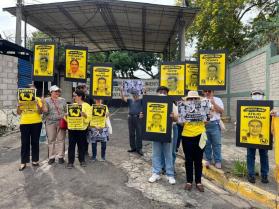Labor Notes: US Intervention in El Salvador, by Privatization This Time
Click here to read the original article on the Labor Notes Blog.
Unions in El Salvador are fighting a bill that would auction off everything from highways, ports, and airports to municipal services and higher education to private companies—mainly foreign multinationals. The United States government, which helped draft the bill, is pushing hard for its passage. If the Public-Private Partnership, or P3, law is approved, workers in those areas will be vulnerable to the massive layoffs, wage cuts, and anti-union persecution that already characterize private sector work in the tiny Central American country. In the 1980s, the U.S. funded, armed, and trained the military forces of the Salvadoran dictatorship, to the tune of a million dollars a day, in a brutal civil war against a popular liberation movement that threatened U.S. business interests. Today, the U.S. and Salvadoran governments are operating a “Partnership for Growth” to promote foreign investment in the country, which the U.S. insists is a modern solution to the country’s underdevelopment. But, according to economist and National University professor Raul Moreno, the increased foreign investment and privatization promoted under earlier U.S.-backed administrations have only worsened labor conditions and sent profits overseas. P3s, says Moreno, are part of a model that has already “demonstrated its failure in El Salvador and throughout the world.” At the heart of opposition to the proposed P3 law are El Salvador’s public sector unions, who have been on the frontlines of the country’s labor movement for decades. In the face of a 2003 attempt to privatize health care, for example, 200,000 public health care workers and supporters poured into the streets and forced the government to abandon the effort. The public electrical workers of the STSEL (formerly STCEL) union, in particular, have a long, radical history. After STCEL staged a national strike in 1980 to protest the repressive military regime, the government jailed the union’s leaders and revoked its credentials. The workers, however, stayed organized, eventually reconstituted the union, and today find themselves once again at the center of the battle, this time against privatization in the form of P3s.
Partnering with Thieves
The case of public electric company LaGeo is “a demonstration of a failed public-private partnership,” said Gilberto García of the Salvadoran Center for Labor Study and Support. “Essentially, they want to take a strategic service from the state in favor of a multinational.” The government restructured the public electricity utility CEL in 1998, and its distribution and systems operations were privatized. Geothermal energy production was separated from CEL and reborn in a public company called LaGeo, still owned by CEL, which today runs two power plants and supplies some 25 percent of the nation’s power. The restructure was a severe blow to the powerful electrical workers union, now known as STSEL. Layoffs reduced CEL staff by 52 percent. “The mission of the company was to annihilate the union,” said Julio Avilés, president of the union’s LaGeo local. “We survived, because here we are, but in many ways weakened.” The government then opened up LaGeo to international bidding, and the Italian company Enel Green Power entered into a public-private partnership with CEL, acquiring an initial 8.5 percent of LaGeo’s shares. Over time, Enel bought up 36 percent of LaGeo. But Enel wanted more. When CEL refused to relinquish its majority ownership of LaGeo in 2008, Enel filed suit for breach of contract in the International Arbitration Tribunal of the International Chamber of Commerce. The tribunal found in Enel Green Power’s favor, ruling in 2011 that the company had a right to increase its stake in LaGeo to a majority of 53.3 percent—and to gain unlimited shares in the company. El Salvador is appealing the ruling, but if the appeal is rejected, the country will lose a valuable resource, as more of the power company’s revenue flows into private hands, draining the public purse. “No More Privatizations,” read one sign at last year’s May Day protest in the capital, San Salvador. “Not in Social Security, Not in LaGeo, and No Public Partnerships with Thieves!” As the threat of privatization grows, workers fear the worst. When the state telecommunications company ANTEL was sold in 1998, 5,000 workers were laid off, and those remaining saw salary cuts, loss of seniority, and their union dissolved. Privatizations at the ports and airports in 2001 had similar results. Security, cargo, and cleaning services at the airport were all privatized. Today, those workers earn about $240 a month, while the unionized airport workers, a principal target of the proposed P3 law, have a minimum salary of $552 a month. At the Acajutla port, nearly 1,000 workers were laid off. Longshoremen’s daily wages dropped 90 percent, and their union was dismantled too.
U.S. Pressure
The LaGeo case and others like it have demonstrated to Salvadoran workers that P3s are not an avenue for national economic growth at all but a boon to transnational big business—at the expense of struggling public sector workers and state budgets. The P3 law threatens to repeat the LaGeo experience in many other now-public industries. If the law is approved, Organization Secretary Jaime Rivera of STSEL warns, “we as a country would lose the opportunity to own companies that generate resources for social investment.” The U.S. government is exerting ferocious pressure on the Salvadoran legislature to approve the law. Ambassador Mari Carmen Aponte has even publicly threatened to withhold a multimillion-dollar development aid project if P3 is not passed. Meanwhile, public sector unions are lobbying legislators and mobilizing workers. A sea of 70,000 red-clad workers, students, and organizers cheered the unions’ vow to fight privatization at a rally last May Day.
Touring the U.S.
In the first two weeks of February, Jaime Rivera of the electrical workers union and Vicente Ramirez of the municipal workers union will travel to cities around the United States. They are calling on the U.S. government to cease its intervention in the Salvadoran legislative process, and asking U.S. unions and labor councils to support their struggle by sending letters to the U.S. embassy and Salvadoran officials and by passing resolutions condemning the P3 law. Hilary Goodfriend is a researcher living in San Salvador. Look here for details on Ramirez and Rivera’s visits to a city in your area and how you can show your solidarity.

 "I am a CISPES supporter because continuing to fight for social justice and a more people-centered country means continuing the dream and sacrifice of thousands of my fellow Salvadorans who died for that vision.” - Padre Carlos, New York City
"I am a CISPES supporter because continuing to fight for social justice and a more people-centered country means continuing the dream and sacrifice of thousands of my fellow Salvadorans who died for that vision.” - Padre Carlos, New York City

